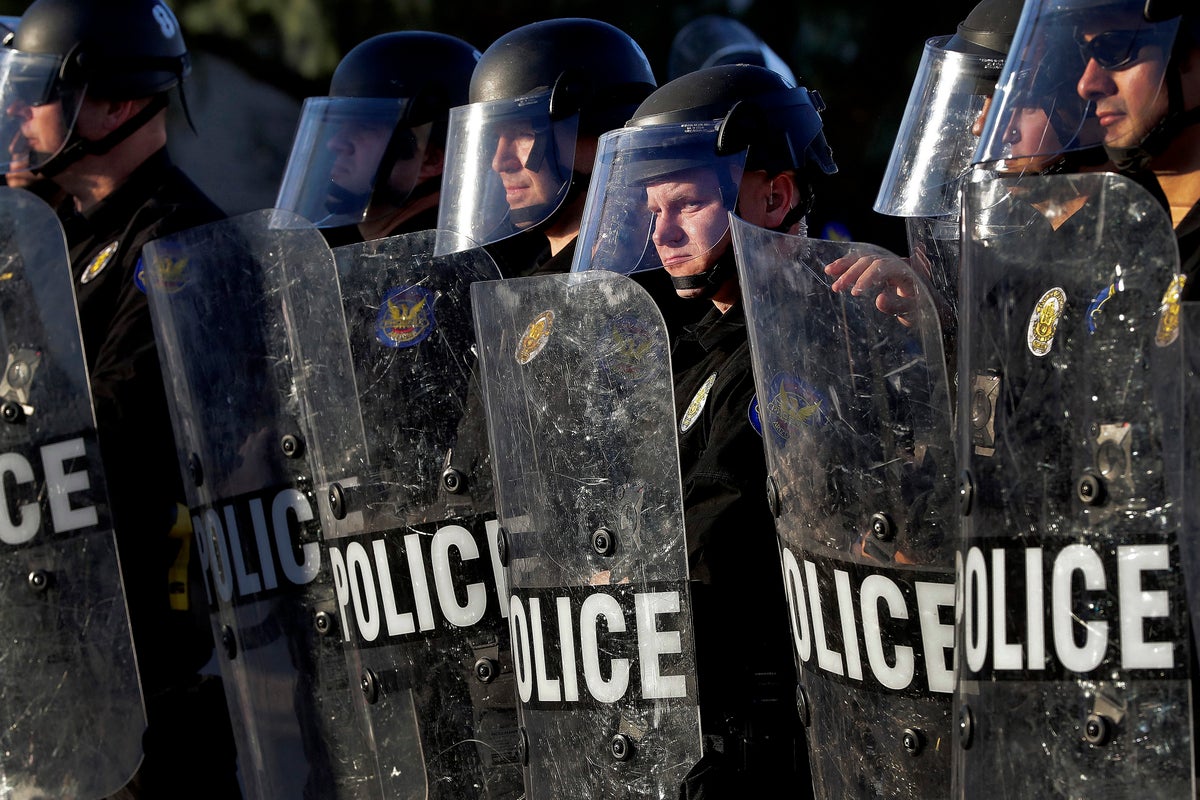
Phoenix police violate people’s rights, discriminate against Black, Hispanic and Native American people when enforcing the law and use excessive force, including unjustified deadly force, the U.S. Justice Department said Thursday.
The government found a “pattern or practice” of the violations, saying the police department unlawfully detains homeless people and disposes of their belongings and discriminates against people with behavioral health disabilities when dispatching calls for help and responding to people who are in crisis. And the Justice Department said Phoenix police had violated the rights of people engaged in protected speech.
The sweeping investigation found “pervasive failings” that have “disguised and perpetuated” problems for years, according to the report.
The Justice Department said certain laws, including drug and low-level offenses, were enforced more severely by Phoenix officers against Black, Hispanic and Native American people than against whites who engaged in the same conduct.
Investigators found Phoenix police use on “dangerous tactics that lead to force that is unnecessary and unreasonable.”
Phoenix police did not immediately respond to a request for comment. Phoenix Mayor Kate Gallego said in a statement that the city received the findings when the justice department announced the report, and officials will meet June 25 to get legal advice and discuss next steps.
“I will carefully and thoroughly review the findings before making further comment," she said.
Attorney General Merrick Garland called the release of the report “an important step toward accountability and transparency.”
“We are committed to working with the City of Phoenix and Phoenix Police Department on meaningful reform that protects the civil rights and safety of Phoenix residents and strengthens police-community trust,” he said in an emailed statement.
Litigation is also an option for the federal agency if efforts to secure a consent decree — a court-enforced plan for reform — are unsuccessful, said Assistant Attorney General Kristen Clarke.
“We remain very hopeful that we can build on the track record of success that we have had in other jurisdictions across our country and put in place a consent decree that contains the strong medicine necessary to address the severe violations identified,” Clarke said.
Similar DOJ investigations, in Albuquerque, Baltimore and elsewhere, have found systemic problems related to excessive force and civil rights violations, some resulting in costly consent decrees that have lasted for years.
This is the first time the department has issued findings like this regarding treatment of Native American people and homeless people, Clarke said.
The police force in Phoenix has been criticized in recent years for its treatment of protesters in 2020, deaths of people who were restrained by officers, and a high number of shootings by officers. Civil rights advocates had complained that Phoenix police and prosecutors were pursuing gang charges as part of abusive political prosecutions intended to silence dissent and scare protesters.
A 2020 case accusing 15 protesters of being in an anti-police gang was dismissed because there wasn’t credible evidence; in 2017, a “challenge coin” was circulated among officers depicting a gas mask-wearing demonstrator getting shot in the groin with a pepper ball; and in June 2019, cellphone video emerged showing officers pointing guns when they confronted an unarmed Black couple with two small children they suspected of shoplifting.
The mayor and city council must act to correct these wrongs, said Poder In Action, a Phoenix advocacy group for people of color and workers. The report’s findings were no surprise, the group said.
“We never needed a DOJ investigation to tell us this,” the group said in a statement. “The data and the stories from residents have been telling us this for years.”
The investigation launched in August 2021. The Justice Department reviewed all Phoenix police shootings from January 2019 to December 2022. The investigation found that police shoot at people who do not immediately pose a threat, and continue to fire their weapons when people are no longer a threat.
The report said some police shootings likely could have been avoided if not for officers’ “reckless tactics.” And investigators found that police “unreasonably delay” providing aid to people they have shot and use force against people who are unconscious or otherwise incapacitated.
The report also found that Phoenix police detain and arrest people who are homeless without reasonable suspicion that they committed a crime, and unlawfully dispose of their belongings.
“A person’s constitutional rights do not diminish when they lack shelter,” the report says.
The Justice Department zeroed on the city’s 911 operations. Even though the city has invested $15 million to send non-police responders to mental health calls, the city hasn’t given the 911 call-takers and dispatchers necessary training.
“Too frequently, they dispatch police alone when it would be appropriate to send behavioral health responders,” the Justice Department said. Officers assume people with disabilities are dangerous and resort to force rather than de-escalation tactics, leading to force and criminal consequences for those with behavioral health disabilities, rather than finding them care, the Justice Department said.
The Justice Department found that police use unjustified force against people who are handcuffed and accused of low-level crimes.
“Officers rely on less-lethal force to attempt to resolve situations quickly, often when no force is necessary and without any meaningful attempt to de-escalate,” the report said.
Police shoot projectiles at people without evidence the person is an immediate threat, the report said, citing the case of a man who was accused of taking his mother’s car without permission.
“The man was leaving a laundromat when an officer immediately fired Pepperballs at him, and continued to fire after the man was on his knees and had curled his body onto the sidewalk,” the report said.







